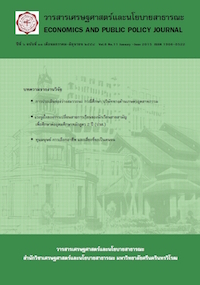ทุนมนุษย์ การเลือกอาชีพ และความเสี่ยงที่จะเป็นคนจน
Main Article Content
บทคัดย่อ
บทความนี้เสนอการวิเคราะห์ปฏิสัมพันธ์ระหว่างการศึกษาและการเลือกอาชีพ ซึ่งส่งผลลัพธ์ต่อรายได้ การออมและทรัพย์สินตลอดชีวิต พร้อมกับ ก) ทดสอบข้อสันนิษฐานว่าการเลือกอาชีพมีความสัมพันธ์อย่างมากกับระดับการศึกษาของหัวหน้าครัวเรือน ข) ความเสี่ยงที่จะเป็นคนจน แตกต่างกันตามระดับการศึกษา เสนอผลการทดสอบเชิงประจักษ์โดยใช้ข้อมูลครัวเรือนของสำนักสถิติแห่งชาติในปี พ.ศ. 2554 พร้อมกับอภิปรายปัญหา “การไม่ได้เรียนต่อ” ของเด็กอายุ 13-18 ปี พบว่า ร้อยละ 19.2 ในกลุ่มนี้ไม่ได้เรียนหรือไม่เคยเรียน แต่ในกลุ่มยากจน--อัตราการไม่ได้เรียนต่อสูงถึงร้อยละ 27.6 เปรียบเทียบกับร้อยละ 7.5 ในกลุ่มครัวเรือนรวย เป็นประเด็นที่ควรสืบค้นเชิงลึกและครอบคลุมปัจจัยเชิงคุณภาพต่อไป ตอนสุดท้ายอภิปรายแนวทางการลดความเหลื่อมล้ำโดยเสนอมาตรการคลังเพื่อการศึกษา (เงินให้เปล่า) อย่างมีเงื่อนไข เพื่อจูงใจให้เด็กยากจนเรียนได้รับโอกาสต่อสายอาชีวศึกษาหรือสามัญตามความประสงค์ของแต่ละคน พร้อมกับคำนวณต้นทุนทางการคลัง
Human Capital, Occupational Choices, and Risk of Being Poor
This paper presents a case study of interrelationship between educational attainment and occupational choices, and investigates differences in income lifetime, saving, and asset by educations and occupations.We use the National Statistical Office’s household survey (conducted in the year 2011) to estimate the probability of being poor by education and occupation. The last section discusses problem of “school discontinuation” among the children age 13-18 year and compares statistics by income quintiles with the note that: on average 19.2% of children did not go to school or never been in school—yet, the incidence of not being in school were much larger among poor children (1st and the 2nd quintiles), specifically 27.6% in comparison to 7.5% among the rich children. This topic is worth serious study that needs an in-depth and qualitative dimdension. The last section asserts that the conditional cash transfer (CCT) that targeted for poor children with area-based and decentralization screening committee may be worth study and the fiscal cost of CCT estimated.
Article Details
สงวนลิขสิทธิ์ © 2553 คณะเศรษฐศาสตร์ มหาวิทยาลัยศรีนครินทรวิโรฒ
คณะเศรษฐศาสตร์ มหาวิทยาลัยศรีนครินทรวิโรฒ จัดพิมพ์วารสารเศรษฐศาสตร์และนโยบายสาธารณะ เพื่อเผยแพร่บทความวิชาการทางเศรษฐศาสตร์ นโยบายสารธารณะ และสาขาอื่นๆที่เกี่ยวข้อง ทัศนะและข้อคิดเห็นใดๆ ที่ปรากฏในวารสารเป็นความคิดเห็นส่วนตัวของผู้เขียน โดยบทความที่ได้รับการตอบรับจะถือเป็นลิขสิทธิ์ของคณะเศรษฐศาสตร์ มหาวิทยาลัยศรีนครินทรวิโรฒ
บรรณาธิการ อาจารย์ ดร.พลพัธน์ โคตรจรัส


